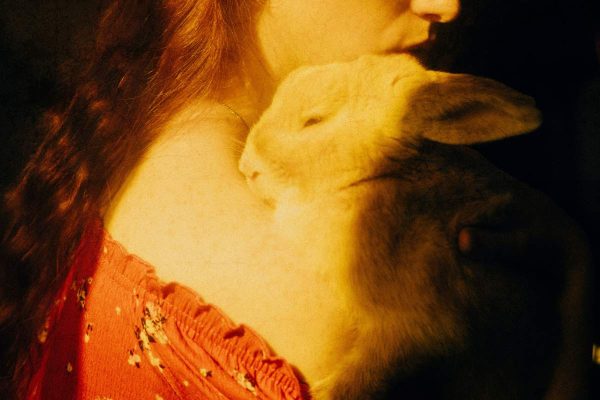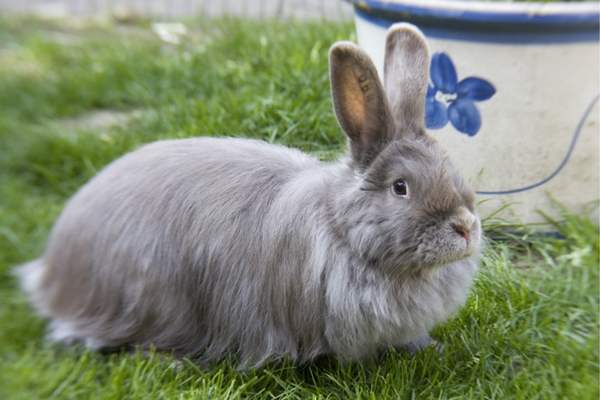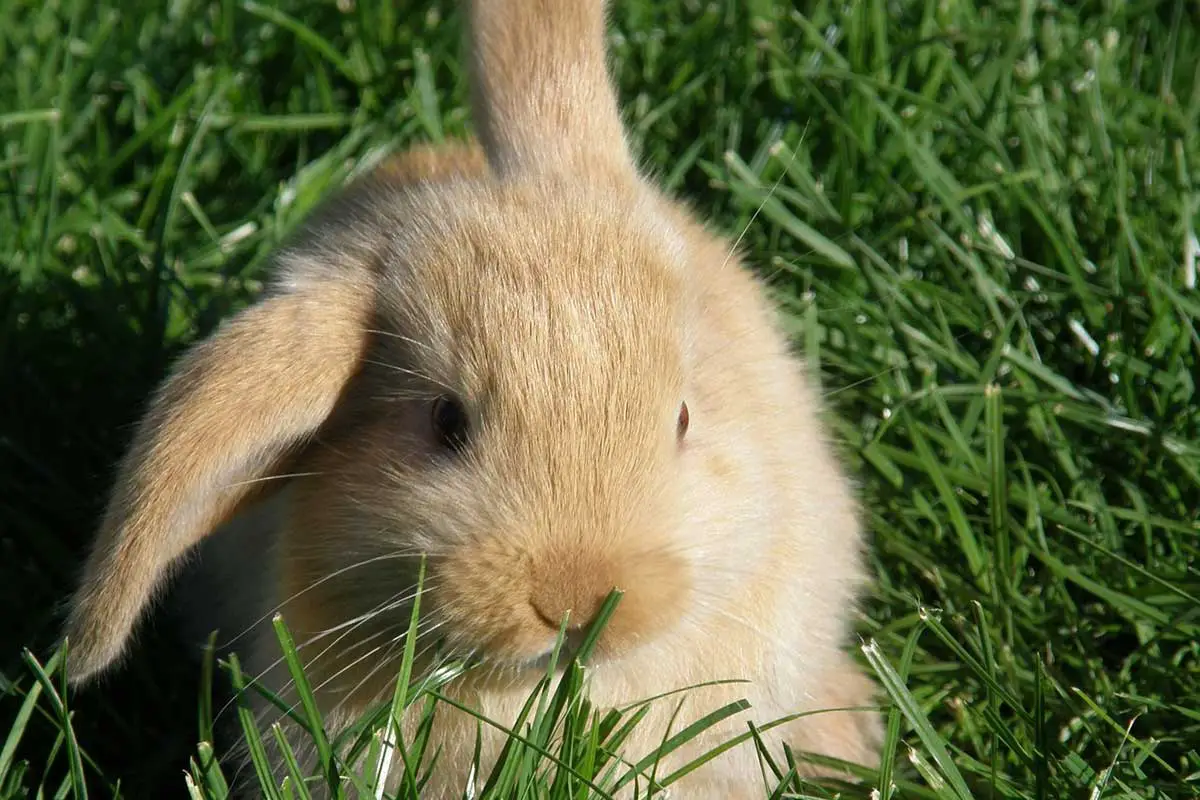Whether it’s just cuddled up and nibbling on a treat, or hopping around your house investigating its surroundings, your pet rabbit is undeniably adorable—especially when it seems to decide that cuddling with you is its favorite thing! However, because bunnies are so different than more common pets like dogs and cats, sometimes their preferences might seem a little strange, and leave us with some questions regarding their behavior. It’s not always easy to tell if what they’re doing is a good thing or a bad thing.
Why does my rabbit like to sit on my shoulder? Rabbits are prey animals, and value having safety and security, as well as having all four feet on a flat surface. Fortunately for your rabbit, your shoulder is the perfect place for all three of those things.
As you read on, you’ll learn more about your rabbit’s behavior when they feel safe and when they feel threatened, and why your bunny seems happy to sit on your shoulder like a fluffy parrot, even though being up there leaves them high off the ground—definitely not a typical bunny habita
Parrot or Rabbit?

If your cuddlebunny is not content with just snuggling up on your chest or on your lap, you may be surprised to find them on your shoulder. It may be a little odd, especially if you’re standing up and your rabbit climbs up from your arms to sit right at your ear, but to your rabbit it makes sense.
On your shoulder, they are extra close to you, and they are able to have all four feet on a secure, solid surface. Your rabbit is trusting you to not let them fall and it might even be enjoying the view! Being higher up gives them a better vantage point for their surroundings and this actually might help them feel even more secure when they see that there are no threats around them.
If you have a rabbit who enjoys perching on your shoulder, you shouldn’t be overly concerned, but perhaps taking a seat when they’re up there is a good idea, as it reduces the risk of them falling, or jumping off abruptly.
Conversely, if you have a rabbit who doesn’t like being high up, don’t try to force them onto your shoulder just because you want them up there. This could lead to a nasty bite or scratch if your rabbit panics, or an injured rabbit if it leaps away from you and falls.
As with any pet, ‘forcing’ behavior is not a good idea, and will just make your bunny anxious and might even hurt them. It’s best to let your rabbit choose their favorite hangout spot at their own pace.
A Safer Place to Sit
Not all rabbits enjoy being held, but some do! If your bunny is all right with it, it’s perfectly ok to give them a cuddle if you hold them gently and make sure that their bottom and their chest are supported so that you have a safe hold on them. You definitely don’t want your pet to accidentally slip out of your arms or fall.
Bunnies have legs that are resilient, but not indestructible, and any fall from above about four feet can injure them. Making sure that both ends of your rabbit are supported by your hands and arms will keep them from feeling insecure and trying to jump down. Spending quality time holding your pet can be good for them if you don’t overdo it and accidentally scare them.
Once your pet is familiar with cuddles and affection, it’s likely that they’ll begin to seek it out—since bunnies are social and enjoy mutual grooming, sitting next to you or on your lap and getting some quality time with you is likely just as enjoyable to them as it is to you!
However, not all rabbits are super affectionate right away, or ever, and that’s ok. Like all pets and animals, rabbits have different personalities, and it’s not always possible to change that about them. With time, you’ll start to learn more about what your pet likes and dislikes, and you’ll be able to find a good middle ground for affection and distance that makes both of you happy.
Rabbits and Fear

Some rabbits may seek you out if they are afraid and need to feel safe, and this may explain why your rabbit suddenly has developed cuddly or shoulder-sitting behavior. It may feel nice to know that your rabbit trusts you to keep them safe, but making sure your rabbit feels secure in their environment is incredibly important, and should be a priority over cuddling them.
A stressed-out rabbit will demonstrate their anxiety in a variety of ways, but common signs are hiding or freezing in place for long stretches of time, keeping their ears pinned back, obvious tension in the body, bulging and extremely watchful eyes, refusal to eat or drink, and an elevated rate of breathing.
Most importantly in reference to your personal relationship with your rabbit, an anxious or distressed rabbit will either hide near you, or conversely not want to be picked up or interacted with at all unless they ask for it.
If you notice any of these signs of stress or sudden behavioral changes in your bunny, this is indicative that your pet is anxious and frightened, and you need to take action to remove any perceived threats and to calm your rabbit down.
Fearfulness in rabbits can lead to more serious issues like constipation and issues with the cardiovascular system—neither of which are good for your rabbit’s long-term health.
Alleviating Their Fears
Try taking a seat near your rabbit without reaching out to touch them and speak softly to them like you would talk to any frightened animal or person. If your bunny does come out to see you, don’t try to pick them up. Instead, offer gentle strokes where you know your pet likes to be touched, like the top of their head or their back.
Avoid abrupt movements or sudden sounds, and instead, try to be still and quiet to demonstrate to your pet that you aren’t going to hurt them. It’s always a good idea to actively offer comfort to your rabbit, as allowing them to continue to be stressed in an effort to have them self-regulate could compound their distress and lead to a variety of health issues.
If stress and anxiety in your pet is constantly present, or if you find that something unavoidable is stressing out your rabbit like a sudden move or a new family member, it’s a good idea to speak to your vet about what you can do to help reduce the impact of this on your rabbit, and keep them healthy.
Safe and Happy

On the other side of the coin, a safe rabbit is a happy rabbit, and a happy rabbit is a healthy rabbit. Having a quiet, stable environment without lots of loud noises or people moving through is ideal for your bunny.
A happy rabbit will have relaxed ears and will either be lying down happily stretched out or with their paws tucked under them, or they’ll abruptly flop down, completely relaxed. More noticeably, a rabbit who is genuinely content in their environment will likely demonstrate playfulness and curiosity, and will actively seek you out for attention and playtime.
For some rabbits, shoulder-sitting is just part of them showing you how happy they are, and demonstrating to you that they enjoy being around you. Some rabbits may even rub their chins on your face or your shoulder while they’re with you– this is them essentially saying that you’re part of their family, and that they trust you a lot.
Regardless of where your rabbit chooses to sit on you, or near you, your bunny actively seeking out your company is an extremely good sign that your pet is happy with you and with their environment. You should be happy too, and proud, as you’ve done a great job making your home rabbit-friendly.
Conclusion
If your bunny likes to climb up on your shoulder, it might be a little odd, but it’s overall a good sign! It means that your bunny trusts you not to let them fall, and also likes to be extra close to you.
If you have a rabbit that does this, it’s completely ok, but do make sure that you are aware that your rabbit doesn’t have perfect balance, and isn’t equipped for falls like a cat might be. Choosing to have a seat, or only walk short distances with a hand on your pet for extra security might be a good idea, just to avoid any unnecessary accidents or emergency trips to the vet.
Overall, though, having a bunny that likes to perch on your shoulder is just a sign that your pet trusts you and likes your company, and that’s always a good thing.
